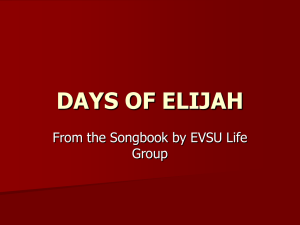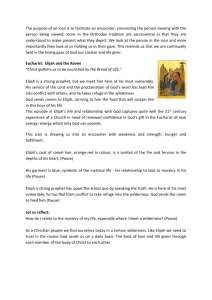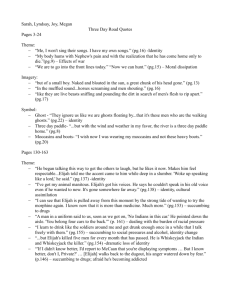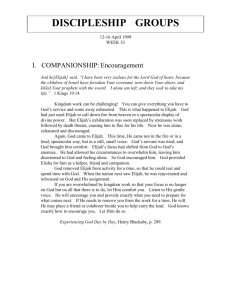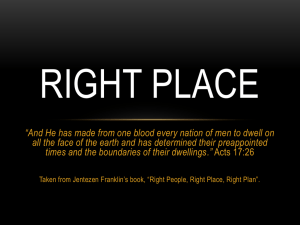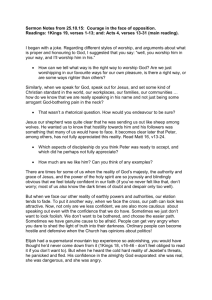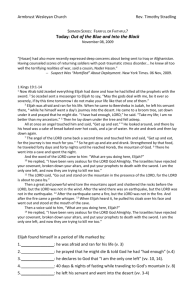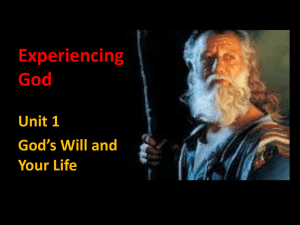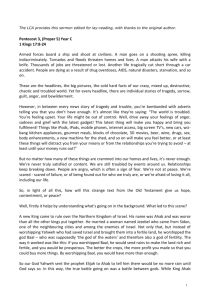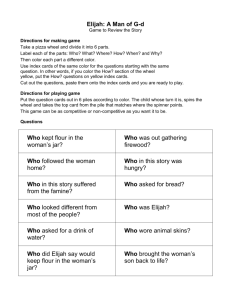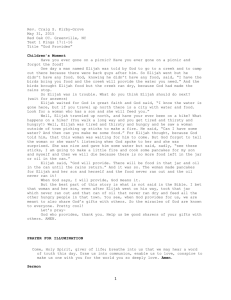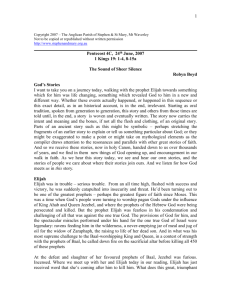fed by ravens
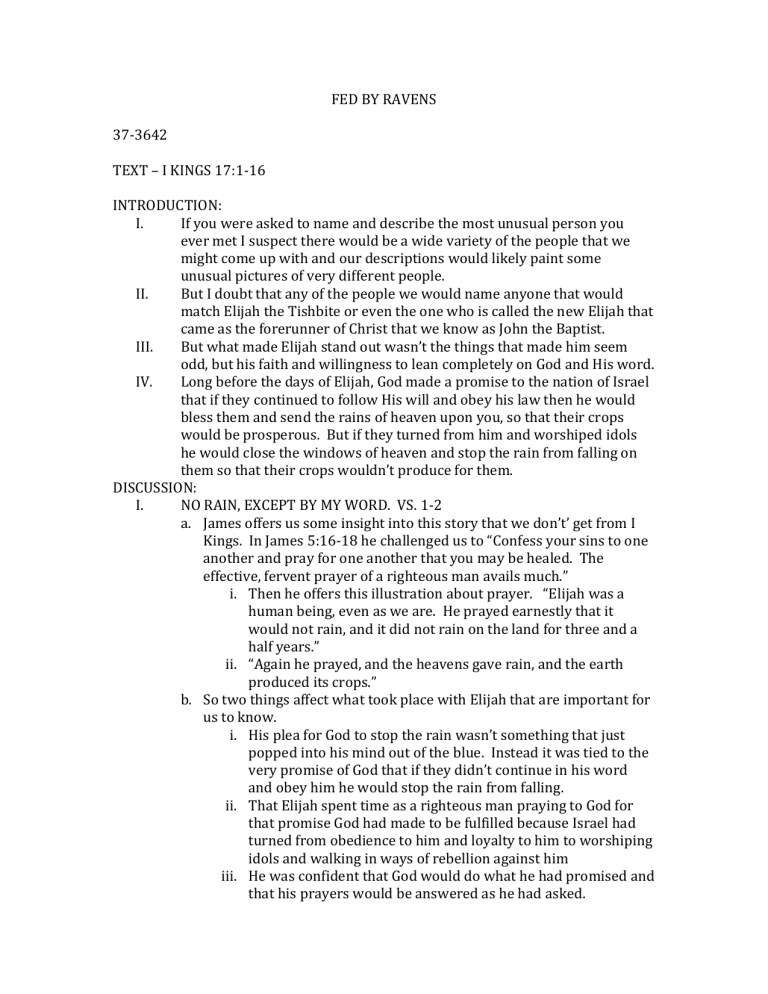
FED BY RAVENS
37-3642
TEXT – I KINGS 17:1-16
INTRODUCTION:
I.
If you were asked to name and describe the most unusual person you ever met I suspect there would be a wide variety of the people that we might come up with and our descriptions would likely paint some unusual pictures of very different people.
II.
But I doubt that any of the people we would name anyone that would match Elijah the Tishbite or even the one who is called the new Elijah that came as the forerunner of Christ that we know as John the Baptist.
III.
But what made Elijah stand out wasn’t the things that made him seem odd, but his faith and willingness to lean completely on God and His word.
IV.
Long before the days of Elijah, God made a promise to the nation of Israel that if they continued to follow His will and obey his law then he would bless them and send the rains of heaven upon you, so that their crops would be prosperous. But if they turned from him and worshiped idols he would close the windows of heaven and stop the rain from falling on them so that their crops wouldn’t produce for them.
DISCUSSION:
I.
NO RAIN, EXCEPT BY MY WORD. VS. 1-2 a.
James offers us some insight into this story that we don’t’ get from I
Kings. In James 5:16-18 he challenged us to “Confess your sins to one another and pray for one another that you may be healed. The effective, fervent prayer of a righteous man avails much.” i.
Then he offers this illustration about prayer. “Elijah was a human being, even as we are. He prayed earnestly that it would not rain, and it did not rain on the land for three and a half years.” ii.
“Again he prayed, and the heavens gave rain, and the earth produced its crops.” b.
So two things affect what took place with Elijah that are important for us to know. i.
His plea for God to stop the rain wasn’t something that just popped into his mind out of the blue. Instead it was tied to the very promise of God that if they didn’t continue in his word and obey him he would stop the rain from falling. ii.
That Elijah spent time as a righteous man praying to God for that promise God had made to be fulfilled because Israel had turned from obedience to him and loyalty to him to worshiping idols and walking in ways of rebellion against him iii.
He was confident that God would do what he had promised and that his prayers would be answered as he had asked.
II.
GOD PROVIDES. a.
Earlier when Abraham and Isaac were walking up Mt. Moriah for
Abraham to fulfill God’s command to take his son, whom he loved and make him an offering to God and as they headed up the mountain
Isaac turned to his dad and asked, “We have the fire and the wood, but where is the offering and Abraham’s answer was “God will provide” i.
When he tied Isaac to the altar with plans to make him an offering God stopped his hand and he spotted a ram caught in the brush and they made that ram an offering to God. ii.
Abraham named the place where it happened “God will provide” iii.
But that was a far cry from the only illustration of God making provision for his people. b.
When Elijah delivered the message that God was stopping the rain to
Ahab the king, God sent him to the Kerith Ravine, east of the Jordan. i.
“You will drink from the brook.” ii.
“I’ve directed the ravens to supply you with food there.” iii.
Would you have trusted this charge?
1.
It was a matter of faith for Elijah. “He did what the Lord had told him.”
2.
He went to the Ravine and stayed there.
3.
Sure enough the ravens brought him bread and meat in the morning and bread and meat in the evening and he drank from the brook. iv.
It stands out that God’s provisions weren’t limited to a means that we might have thought reasonable. He used the ravens and had them to fulfill his mission. v.
Nothing is beyond the power of God in doing what he promises. c.
Later the brook dried up for lack of rain in the land. God had another means of providing for Elijah’s needs. i.
Go to Zarephath in the region of Sidon and stay there. “I have directed a widow there to supply you with food.” ii.
He came to the town gate; a widow was there gathering sticks.
He called to her and asked, “Would you bring me a little water in a jar so I may have a drink?”
1.
As she was going to get it, he called, “And bring me, please a piece of bread.”
2.
“As surely as the Lord your God lives,” she replied, “I don’t have any bread – only a handful of flour in a jar and a little olive oil in a jug, I am gathering a few sticks to take home and make a meal for myself and my son that we may eat it – and die.”
3.
Does it seem strange that God would send the prophet to the home of a widow and her son who didn’t have food to take care of them to ask her to take care of him?
iii.
Elijah said to her, “Don’t be afraid. Go home and do as I have said, but first make a small loaf of bread for me from what you have and bring it to me, and then make something for yourself and your son. For this is what the Lord, the God of Israel, says:
“The jar of flour will not be used up and the jug of oil will not run dry, until the day the Lord sends rain on the land.” iv.
She went away and did as Elijah had told her. So there was food every day for Elijah and for the woman and her son. For the jar of flour was not used up and the jug of oil did not run dry, in keeping with the word of the Lord spoken by Elijah. d.
The God who provides can do so directly as he did with Israel when he fed them with manna from heaven and with quail that he had to fly into the camp. But most of the time he provides through some agency.
With Elijah it started with ravens serving as waiters to bring him bread and meat. He then used a widow who had a son to take care of him with the bare minimum that they had thought would only provide for a last meal for them. e.
It is powerful to know that God used providing for the prophet Elijah as a means of providing for the widow and her son at the same time.
III.
CONCLUSION: a.
God provides. His promise from the lips of Jesus was “Seek first the kingdom of God and his righteousness and all these things will be added to you.” Matthew 6:33 b.
He had just been talking to them about food, shelter, and clothes.
Those who built their lives around providing those things he declared were like the Gentiles. Their lives were centered on the wrong thing.
We should put him and his kingdom first and trust him to supply the other things that are needed in life. c.
God provides. Will you put your trust in him who trust sometimes directly and sometimes through nature? But he also provides through the church, the body of Christ. We need to trust him to provide in our lives but to also be wide away to listen for his call on us to be his hands and feet in providing for another person made in his image.
